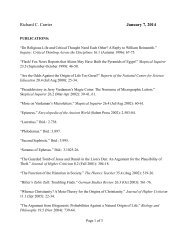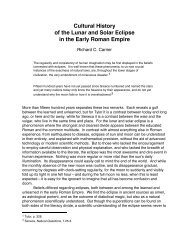“Bayes' Theorem for Beginners: Formal Logic and ... - Richard Carrier
“Bayes' Theorem for Beginners: Formal Logic and ... - Richard Carrier
“Bayes' Theorem for Beginners: Formal Logic and ... - Richard Carrier
Create successful ePaper yourself
Turn your PDF publications into a flip-book with our unique Google optimized e-Paper software.
Nesting Test <strong>for</strong> Minor Premise 3:<br />
Major Premise 4: If there can be no exceptions to a rule {if A, then<br />
B} then it is always the case that {if A, then B}.<br />
Minor Premise 4: There can be no exceptions to the rule {if a large<br />
number of representatives of a class have property x, <strong>and</strong><br />
there is insufficient data to confirm any members of that<br />
class lack x, then all members of that class have x}.<br />
Conclusion (= MnP 3): There<strong>for</strong>e, if a large number of<br />
representatives of a class have property x, <strong>and</strong> there is<br />
insufficient data to confirm any members of that class lack<br />
x, then all members of that class have x.<br />
Defeat of Minor Premise 4 (hence of Major Premise 1):<br />
There can be exceptions to the rule {if a large number of<br />
representatives of a class have property x, <strong>and</strong> there is<br />
insufficient data to confirm any members of that class lack<br />
x, then all members of that class have x}.<br />
Correction of MnP 4 (hence of MjP 1):<br />
There can be no exceptions to the rule {if a large number of<br />
representatives of a class have property x, <strong>and</strong> those<br />
members were effectively selected at r<strong>and</strong>om from among<br />
all members of that class, <strong>and</strong> there is insufficient data to<br />
confirm any members of that class lack x, even though it is<br />
somewhat probable we would have such data in at least one<br />
instance if many members of that class lacked x, then it is<br />
at least somewhat probable that any given member of that<br />
class has x}<br />
RESULT: Through nesting we locate the underlying rule, discover its flaw, <strong>and</strong> when we<br />
correct that flaw, we discover the necessary qualifications <strong>and</strong> analyses we may have<br />
overlooked be<strong>for</strong>e. For instance, in this case: (a) we now know we should qualify our<br />
premises (<strong>and</strong> thus our conclusion) as a matter of probability, <strong>and</strong> a probability less than<br />
what we would consider a historical certainty; (b) we now know to ask whether we<br />
should even expect evidence of major cities lacking public libraries, if any did in fact lack<br />
them; <strong>and</strong> (c) we now know to ask: is the sample of major cities <strong>for</strong> which we have<br />
confirmed public libraries effectively a r<strong>and</strong>om sample of all major cities—<strong>and</strong> if not,<br />
will the known bias in sampling affect our conclusion?<br />
As to (b), we might be able to say that if there were many such deprived cities, we<br />
should have evidence of at least one case, whereas if there were only a few, we might not<br />
have evidence of that, <strong>and</strong> as to (c) we might observe that the bias now is in fact against<br />
having evidence <strong>for</strong> the largest of cities (since modern cities often st<strong>and</strong> on top of the<br />
most successful ancient cities, making archaeological surveys spotty at best), <strong>and</strong> since it<br />
10








